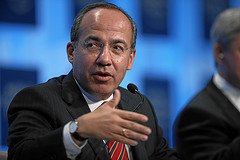
Beyond Borders, Dispatches, United States
Targeting Gangs Imperils Immigrant Communities, Advocates Say
April 15, 2010 By Alison Bowen
At the conference, actors from Houses on the Moon Theater performed part of their new play, De Nova, about a boy fleeing a gang in Guatemala. Photo by Alison Bowen.
NEW YORK — Police officers trying to snare gang members often instead profile immigrant communities, argued organizers at a panel last week.
The four-hour conference, “Fighting the Criminalization of Youth, Immigrants and Activists,” explored what happens when youth enter gangs, governments target gangs, and police then heighten enforcement in those communities.
Organizers said a federal, instead of local, focus on gang members – especially for Central American gangs like MS-13 – means that police targeting gangsters are actually terrorizing immigrant communities.
The conference centered on the case of Alex Sanchez, a former gang member who co-founded Homies Unidos, an anti-gang violence nonprofit. Last June, he was charged with allegedly playing a role in a 2006 assassination in El Salvador.
Since then, friends have worked to get him released from prison and portrayed the charges as prejudice against gang members, even those who have moved on and tried to help others get out.
Connie McGuire, a University of California-Irvine student studying public policy toward gangs, presented research showing gangs are now considered as a transnational, not local, problem by the U.S. government.
For example, in February, the U.S. State Department presented the “U.S. Strategy to Combat the Threat of Criminal Gangs from Central America and Mexico” to the Organization of American States, outlining how gangs are an international threat.
El Salvador, Mexico, Guatemala and Honduras were highlighted as hotbeds of gang activity.
This emphasized international focus includes sharing information and law enforcement between countries, through programs like the Central American Law Enforcement Exchange, an El Salvador-U.S. partnership operated by the Federal Bureau of Investigation.
In October, 27 officers participated in training at the FBI’s MS-13 National Gang Task Force in Charlotte, North Carolina.
Officers share fingerprint and photo databases, McGuire told the audience of about 100 people, mostly students and faculty from sponsoring schools New York University and John Jay College of Criminal Justice. To El Salvador, ahead of a deportee’s arrival, they send a full file with an immigrant’s criminal history, she said.
McGuire said the international focus on gangs results in police officers zeroing in on international residents of local communities, especially in the “gang capital of the world” – Los Angeles.
“Immigrant communities are perceived to be the origins of the gangs targeted,” said McGuire, who previously worked at the Washington Office on Latin America.
New York University student Andrés Garcia started studying the police in New York City after he, his friends, his family and others in his community kept getting stopped, when, he said, “We were just playing a simple game of handball.”
He said officers in his neighborhood, Jackson Heights, Queens, asked for their addresses and what they were doing. The New York Police Department built command posts in the area, walking down the main artery, Roosevelt Avenue, with German shepherds, guns and helicopters overhead.
Garcia said he’d never seen this type of police activity before, and it inspired him to write his thesis on Operation Impact, a state program that pairs rookie coops with supervisors and sends them into crime ridden areas.
Supporters of the program say it cuts crime in tough neighborhoods. Others, like Garcia, say it shifts crimes to different neighborhoods and produces militarized policing.
“This tactic was this idea of let’s flood a neighborhood that has social problems,” he said, adding that to him, this meant Latino or immigrant neighborhoods.
Conference organizers wanted to connect lines between immigrant rights, juveniles involved in gangs and the communities internationally struggling with these issues.
“This case is not about any one man or any one agenda,” said Sergio Argueta, founder of Struggling to Reunite Our New Generation (STRONG), a sponsor and anti-gang violence group.
At the end of the conference, sponsors collected signatures for a letter they plan to submit to Attorney General Eric Holder, asking him to drop all charges against Sanchez.
They also asked for donations to replace a stolen $80,000 laser, an important tool stolen from Sunrise Community Outreach, a Los Angeles group providing low cost tattoo removal
NYU student Maxiel De La Rosa said she attended to hear from Sanchez, who addressed the group on Skype, and was overwhelmed by how much she’d learned, especially about police stops in Jackson Heights.
“I had no idea that in my borough, that was going on,” she said.
About Alison Bowen
Alison is a Missouri native and New York City freelance writer who has wanted to cover Latin America since studying Spanish in Central America. After moving to Brooklyn, her work has appeared in The New York Times, the Daily News, the Manhattan Times and Women’s eNews. She earned a master’s degree in journalism and Latin American and Caribbean studies at New York University. Her thesis focused on immigration policies after September 11, including counterterrorism measures, and their effects on the daily lives of immigrants in New York City.





7 Comments
Boy this is rich. “Advocates” are angry because authorities are arresting gang members. Unbelievable.
I want to thank all the organizers of this important and educational conference. We should not just jump on conclusions on what we hear from mainstream media or law enforcement. Educate yourselves on the issues before you make ignorant comments. Log on to wearealex.org and learn what the case of Alex Sanchez is about.
In my thinking, there are no immigrant neighborhoods ( all Americans were immigrants at one time) you are and American or live and hide in illegal neighborhoods, if this is the case sorry, deal with it, or go back to were you come from. Second option, clean up your own neighborhood and stop the gangs yourself.
If you are a misplaced person just wanting to improve your families life, get with the program, get a green card become legal and help all Americans clean up this country.
So Latinos support their law-breaking brothers and sister because they are Latino? Talk about racist! All illegals need to go home and do it the legal way. You cheated. There are no rewards for cheating.
[…] […]
[…] […]
racial profiling. stop the profiling. it discriminates.
Comments are closed.